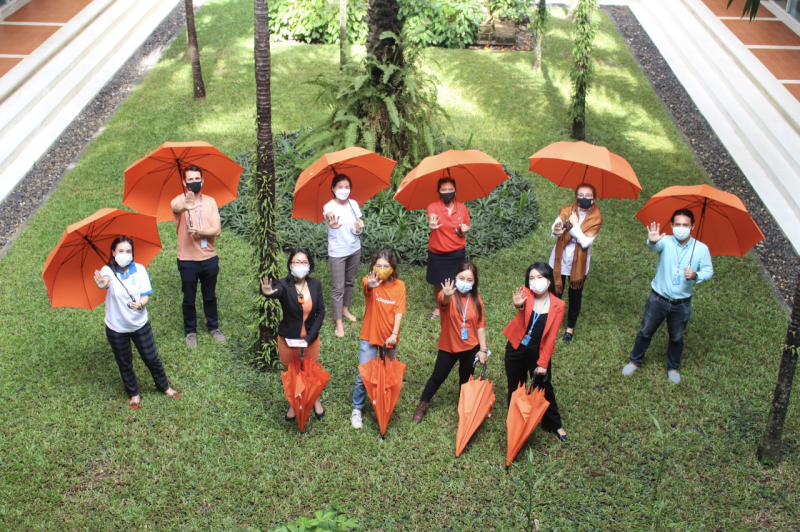

Gender-based violence continues to deprive women around the world of their right to live a life of dignity and equality. The 16 Days of Activism Campaign began in 1991 as a call to end violence against women. Now, 30 years later, every year, we still need to make the same call.
This call is relevant in Lao PDR as much as elsewhere around the world.
A study conducted in 2014 revealed that more than 30 per cent of ever-partnered women in Lao PDR have experienced physical, sexual or emotional violence by a male partner in their lifetime. Women who experience physical or sexual abuse are more likely to suffer miscarriage, stillbirth, or abortion, as well as experience mental health issues such as insomnia, anxiety, or depression. Despite the devastating impact of violence, most women will remain silent. In Lao PDR, just two per cent of women will report experiencing acts of violence.
So why is this still happening, and why are so few reporting it?
Opening of Women's Protection Shelter in Savannakhet in December 2020. Deputy Minister of ICT, Savannakhet Vice Governor, LWU Vice President, UK Ambassador to Lao PDR, UNFPA Representative Lao PDR and President of Savannakhet LWU.
Lao PDR has a strong legal and policy framework in place to combat gender-based violence that outlines clear obligations of each sector to protect the rights of women. However, when harmful social and cultural norms that normalise violence and, at times, stigmatise survivors seep into the very system designed to protect them, women are silenced.
Having robust laws and policies in place is an important step towards ending violence against women, but to meet these obligations, we must take a whole-of-society approach where actions are taken by all of us, working together.
Research on violence against women has consistently supported the use of an integrated and coordinated multi-sectoral approach to respond to and prevent violence, and we can see how effective it is for our neighbours. In Thailand, there are more than 22,000 One Stop Crisis Centres that not only respond to requests for support but also raise awareness to prevent violence from occurring in the first place. Similarly in Viet Nam, Peace House shelters work with Rapid Response Teams to provide targeted and timely coordinated services to survivors. Multisectoral services are also being provided in Indonesia, Timor-Leste, the Philippines and beyond.
In Lao PDR, the National Commission for the Advancement of Women, Mothers, and Children (NCAWMC) and the Lao Women’s Union (LWU) are working towards adopting a similar integrated approach, with all GBV response actors aiming to operate under a single umbrella of protection.
Through the Khan Hom (umbrella) Project, UNDP and UNFPA, in partnership with KOICA, are supporting NCAWMC and the LWU to bring together the key health, social, and justice sectors to achieve the ambitions of the Second Five-Year National Action Plan on Preventing and Eliminating Violence Against Women 2021-2025 (NAPEVAW). The Khan Hom Project aims to implement the Essential Services Package for Women and Girls Subject to Violence (the ESP), a globally recognised tool which serves as the gold standard for narrowing the gap between international commitments and on-the-ground provision of coordinated and quality essential services.
KOICA, LWU, UNFPA, UNDP (Khan Hom Project) partnered with the EU, with participation from civil society and international organisations, private sector, and women's groups, to celebrate the 111th anniversary of International Women's Day to raise awareness on gender equality, women's empowerment, and the impact of COVID-19 on women.
At the core of achieving the ambitions of the recently endorsed NAP EVAW, supported by UNFPA and KOICA, is multisectoral coordination and collaboration. The NAP EVAW calls for the health sector to provide essential and quality health services to survivors of violence, from first aid and psychosocial counselling, to providing medico-legal reports. The justice sector to support survivors throughout the full legal process, ensuring accessibility of legal aid, survivor-centred investigations and court proceedings, and perpetrator accountability. The social sector is required to provide shelter and rehabilitation, prioritising the safety of women and supporting survivors’ return to society.
However, the ESP and the NAP EVAW only make up part of the umbrella. We all have a role to play to widen the shade of protection.
Civil society organisations must stand firm in their role in monitoring progress and advocating for change. We rely on international organisations and development partners to continue to prioritise gender equality, women’s empowerment, and the elimination of gender-based violence in their cooperation with the Lao PDR. Organisations, workplaces, and communities must exercise zero tolerance against all forms of discrimination and violence. Community leaders, men, and boys must become champions for gender equality and women’s empowerment.
Through this 16 Days of Activism, we call on allies to combat gender-based violence by joining us in rejecting all forms of discrimination against women and girls, relegate violence against women to history, and respect, protect, and promote women and girls’ rights in Lao PDR and the world!